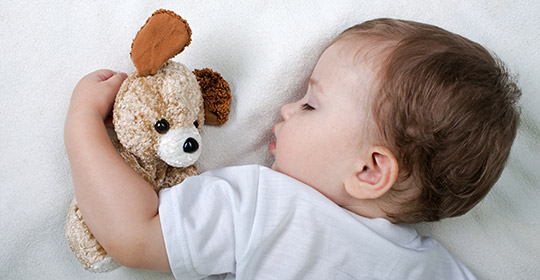Growing healthy sleep habits in children
Did you know that the release of growth hormones in children occurs primarily at night? That’s not all! Read this article to learn more about the benefits of a good night’s sleep for your little ones.
Busy little bodies at night!

When children sleep, their bodies are hard at work. In fact, there are many mechanisms at play as they slumber: their nervous system organizes itself, their immune system strengthens, and their brain registers the knowledge acquired during the day. Nighttime is also the time when growth takes place.
The importance of dreaming
Nightmares and dreams play an important role in the psychological development of children. For instance, they contribute to their emotional and mental well-being, since they help evacuate any tension built up during the day.
Sleep needs for each age group
The number of hours of sleep needed by children changes gradually from birth to adolescence.
|
Age |
Hours of sleep needed |
|
0 to 6 months |
16 to 20 hours |
|
6 to 12 months |
About 15 hours |
|
12 to 36 months |
About 13 hours |
|
3 to 5 years old |
About 12 hours |
Most school-aged children require approximately 10 hours of sleep every night. Around the age of 12, the sleep cycle begins to change due to hormonal changes associated with puberty. That explains in part why you have such a hard time getting your teen out of bed in the morning!
Good to know!
Some children do not sleep the recommended number of hours. This is not necessarily a problem. If you are concerned about your child’s sleeping habits, however, talk to your doctor.
Helping children fall asleep
To help young children fall asleep, a bedtime routine, which can include a bath, quiet games and a bedtime story, is essential. A consistent routine helps to trigger sleep mechanisms. Ideally, your child should go to bed at the same time every night.
To get a good night’s sleep, children need to feel secure. They must be reassured and have the chance to discuss any worries they may have. You can also turn on a nightlight or keep the door ajar if this is something your child needs.
Good to know!
Don’t ignore the signs of sleepiness! Yawning and eye rubbing are indications that children are ready for bed. That’s your cue to help them nod off to dreamland.
Paying attention to sleep problems
Certain children have issues with sleep. They may wake up several times during the night or experience sleepwalking, night terrors or crying fits. Others have a bedwetting problem. If any of these issues persist, talk to your pediatrician. You may also want to consult a doctor if your child:
- is agitated or hyperactive during the day;
- finds it difficult to wake up in the morning;
- experiences a loss of appetite;
- has problems concentrating at school;
- is afraid to go to bed.
Pharmacy services
Need advice? Just talk to your pharmacist. He’s there to help!
The pharmacy services presented in this section are offered by pharmacist owners who are affiliated with Uniprix. The pharmacists are solely responsible for the professional activities carried out during the practice of pharmacy. These services are offered in participating pharmacies only. Certain fees and conditions may apply.
* The information contained herein is provided for informational purposes only and is not intended to provide complete information on the subject matter or to replace the advice of a health professional. This information does not constitute medical consultation, diagnosis or opinion and should not be interpreted as such. Please consult your health care provider if you have any questions about your health, medications or treatment.
